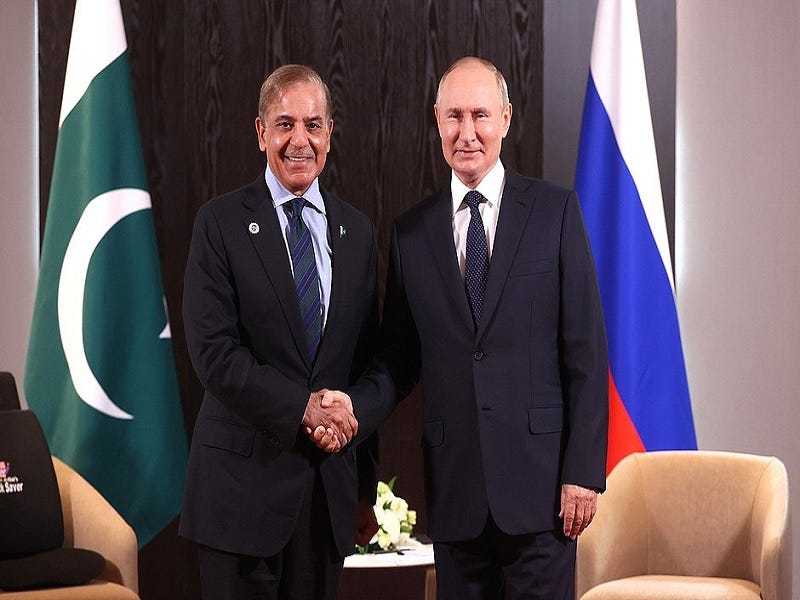While Russia has reasons to wonder whether Pakistan is beginning to become an obstacle to Eurasia’s multipolar integration due to the influence exerted upon its newly installed leaders by the US, it’s still holding out hope that this isn’t the case and that any prior moves in this direction can still be reversed in pursuit of their objectively shared interests.
Russian President Vladimir Putin met with Pakistani Prime Minister Shebhaz Sharif, who was installed through a US-orchestrated post-modern coup in early April in response to his multipolar predecessor’s independent foreign policy but subsequently recognized by Moscow in the interests of pragmatism, on the sidelines of this week’s SCO Summit in Samarkand. He reaffirmed his optimism about their bilateral relations that he expressed last month in the message that he sent on the occasion of that country’s Independence Day.
In particular, the Russian leader spoke about their promising connectivity potential in energy/pipelines and logistics/railroads, especially through Afghanistan. This suggested that he still hopes that Pakistan will continue playing its role as the Zipper of Eurasia, the mutually beneficial concept of which has driven their rapid rapprochement over the past-decade, instead of grotesquely transforming into the “Faultline of Eurasia” like is possible if South Asia’s grand strategic reorientation that was catalyzed by last spring’s post-modern coup is carried out to its logical conclusion.
The caveat, however, is that the situation in Afghanistan would first have to stabilize in order to fully unlock these two countries’ complementary multipolar potential. President Putin proposed that “I also have in mind Pakistan’s ability to influence the situation there”, which can be interpreted as conveying an indirect message pertaining to Moscow’s suspicions about the possible change in Islamabad’s role over that country in the five months since the post-modern coup. Recent events have made some wonder whether Pakistan is now becoming an obstacle to Eurasia’s multipolar integration.
Its dangerous security dilemma with the Taliban worsened after the latter accused Islamabad of secretly allowing an American drone to transit through its airspace to attack Afghanistan in earlier August. Then ISIS-K’s suicide bombing attack against the Russian Embassy in Kabul a few weeks back prompted questions about whether Pakistan’s powerful ISI spy agency, which is regarded as the predominant foreign force in that neighboring country, might have at the very least had some advance knowledge of that plot but didn’t pass it along for whatever reason.
Against this very sensitive context, President Putin’s proposal for Pakistan to leverage its influence in Afghanistan for the purpose of stabilizing the situation there and subsequently unlocking those two’s complementary multipolar potential is a tacit reference to those concerns. The Russian leader is essentially suggesting that this would prove Pakistan’s geostrategic intentions and thus allay all relevant stakeholders’ worries about its foreign policy trajectory after the post-modern coup, which is why he brought this up in public instead of only discussing it behind closed doors.
From this observation, it can be said that while Russia has reasons to wonder whether Pakistan is beginning to become an obstacle to Eurasia’s multipolar integration due to the influence exerted upon its newly installed leaders by the US, it’s still holding out hope that this isn’t the case and that any prior moves in this direction can still be reversed in pursuit of their objectively shared interests. It’s unclear what timeline President Putin has in mind for seeing meaningful progress on this front before arriving at an answer to that question, but everything should be a lot clearer by early next year at the latest.





Come at us bro. You helped break us once. We'll help break you the second time.